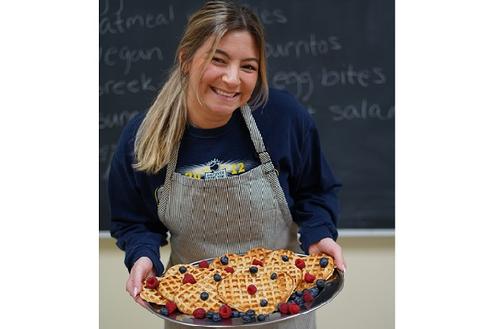Telenutrition Study Led by Harrison County Native with Local Doctors Participating to Aid State Residents
 The study provides free telenutrition coaching for patients throughout the state who meet eligibility requirements and have been referred by their primary care physician.
The study provides free telenutrition coaching for patients throughout the state who meet eligibility requirements and have been referred by their primary care physician.
Telenutrition is the delivery of nutrition care using technologies like Zoom, which allow patients to receive care directly in their homes. By using technology as the delivery method, geographical barriers are eliminated, giving patients improved access to nutrition care.
Participants in The iNutrition COACH WV Study will work one-on-one with a registered dietitian nutritionist and a team of student nutrition coaches who understand the complexities of many chronic health conditions and are trained in behavior change.
“Being in a rural state that leads the nation in rates of obesity, hypertension and type 2 diabetes, this mode of healthcare delivery is crucial as we work to improve access to nutrition care to West Virginians through their primary care doctors – several with whom we are proud to collaborate for this particular study,” she added.
Area doctors, including those who collaborated on the pilot study (James Malone, DO; Dominick Woofter, MD; and Kelly Nelson, MD), along with several other providers in the surrounding area are collaborating on the study.
“The last study we did with Dr. Marra – the telemedicine study focused on weight loss for middle-aged men – was really pretty impactful,” Dr. Nelson said. “I had a lot of patients participate, and a lot of them had great success, including many who had long-term success. Certainly, obesity is a major issue in West Virginia and in north central West Virginia, and anything we can do to tackle that in a healthy and holistic way, I’m a big proponent of.”
“I have relatives in rural counties throughout the state who have actively struggled to get to doctor’s appointments and obtain nutritional advice because of the distance—which, for them, involves taking time off work and getting an appointment that is actually worth taking the time to go to and learn all the information necessary in a short amount of time,” Witt explained. “It’s very difficult for those people, and so being able to meet with your provider online – especially from a nutrition-perspective and with a dietitian—is extremely beneficial.”
Witt went on to explain that, from a dietitian or nutrition coach’s perspective, it takes more than one appointment with a patient to cover everything needed, as you don’t want to overwhelm the patient—something she learned from her nutrition classes with Dr. Marra.
“You definitely need to meet with your nutrition team more often, and telehealth breaks barriers to allow you to meet more frequently and get the advice and support that you need,” she said.
Breaking barriers while empowering individuals to make informed, health-supportive dietary choices is at the heart of the Healthspan Nutrition Lab’s mission as it exemplifies the university’s land-grant mission, which includes advancing education, healthcare and prosperity for all by providing access and opportunity and advancing high-impact research.
“Our main, two-fold goal is to train the future workforce and improve the health outcomes for fellow West Virginians, and the fact that we get to work toward that goal together and see the impact of our efforts right here in our hometown is special,” Marra said. “I’m grateful and honored that I get to work alongside passionate providers in the state and students as we move toward fulfilling a shared vision for a healthier West Virginia.”
If your provider is a study collaborator, you may receive an invitation to learn more about the study via your MyChart account. Currently, the following providers are study collaborators:
-
Andrea Huffman, MD, UHC Salem Family Medicine -
James Malone, DO, Family Medicine, Mountaineer Medical -
Kelly Nelson, MD, Family Medicine, Mountaineer Medical -
Jessica Sias, NP, UHC Salem Family Medicine -
Dominick Woofter, MD, Woofter Family Medicine
This study is funded by the Agriculture and Food Research Initiative (AFRI) Grant no. 2022-68015-37263 from the USDA National Institute of Food and Agriculture (NIFA), with support from the West Virginia Clinical and Translational Science Institute (WVCTSI).
Editor’s Note: Bridgeport native Alexandria “Ali” Witt, a WVU senior styding human nutrition and foods, is shown above.

